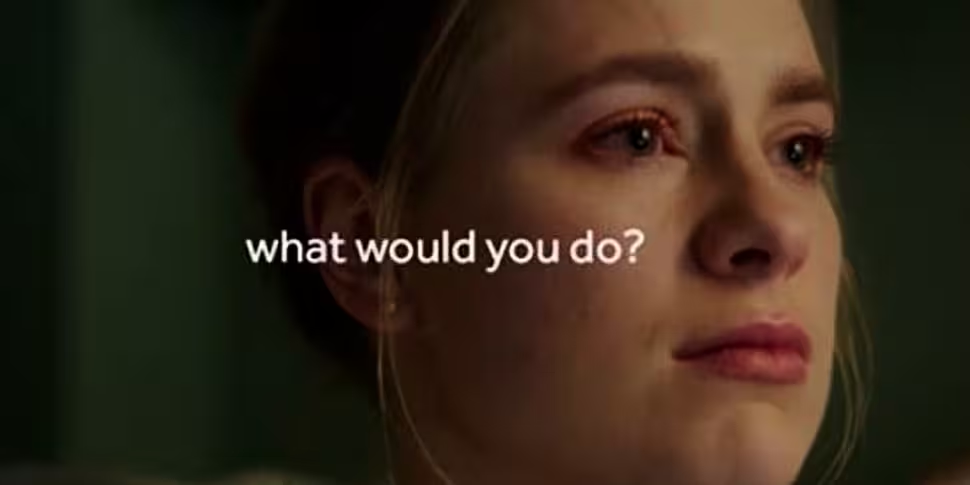Don’t be a Bystander - SPEAK OUT
Domestic violence.
That’s something that happens to other people right?
People we don’t know, behind closed doors?
In fact, 2 out of every 5 people in Ireland know someone who has experienced domestic abuse.
But it’s easier to turn away or tell ourselves we shouldn’t get involved.
Research carried out on behalf of Cosc found that one of the main reasons people would not intervene, if they witnessed domestic violence, was because…they wouldn’t know what to do.
But what if someone you cared about was suffering from domestic abuse and was too afraid or too ashamed to tell you?

It’s not easy.
Witnessing Domestic Violence.
In fact, it can be terrifying...overwhelming.
But that’s ok, that’s normal.
What’s not ok, is to do nothing about it.
If we do nothing, we leave another victim behind.
We all have a responsibility and we all have questions we need to ask ourselves:
Q: If I come across an incidence of domestic violence, what’s the best way to intervene?
How to intervene if it is someone you know:
If you suspect someone you know is being abused, don’t wait for them to approach you - follow your instincts.
Look for a private moment where you can express concern and let them know you’re there for them.
- Express concern
If they deny that anything is wrong, don’t push, but communicate that you’ll be there for them if they ever want to talk.
- Assure them that the violence is not their fault.
This can be such an important thing for a victim of violence to hear. Some useful things to say might be, “No one deserves to be treated this way,” “You are not to blame”
- Support, but don’t give advice
Be aware that leaving an abusive relationship is the most dangerous time for a victim. The victim is best placed to assess the danger to themselves.
- Give them resources
There are several agencies in Ireland who can offer help and support. Check out www.whatwouldyoudo.ie for a list of services and advice.
How to intervene if it’s a stranger:
If you decide that a situation requires an intervention and you are happy that it is safe to do so, try following one or more of the three D’s.
- Distract
Creating a distraction is an indirect and non-confrontational way to intervene. If you can, use a distraction that will get you a moment alone with the victim, to ask is there a problem.
- Delegate
Even if you don’t know the victim and the abuser, someone else might. Friends might be in a better position to get involved, and they might have a better opportunity for a sustained intervention than you.
- Direct
If you’re going to try a direct approach, your best bet will probably be to approach the victim. You can simply say, you’re concerned, that you want to help and it’s not their fault.

Q: Should I get involved?
While anyone can be a bystander, an active bystander is someone who recognises a problem and decides to intervene in a way that feels safe and appropriate for him or her at the time.
There is no ‘right way’ to be an active bystander. Being an active bystander may mean intervening in violence that is already occurring, whether it’s physical, verbal, emotional, or sexual abuse.
The abuse could be between people you don’t know, or you may find out about a friend or acquaintance who is experiencing violence.
But speaking up against abuse that is already occurring is only a small part of bystander intervention.
Q: Should I talk to the person I suspect to be a victim of domestic violence?
Recent research carried out on behalf of Cosc found that
8 in 10 people would ask a suspected victim of domestic violence, if they were“ok” - without mentioning the abuse.
However, of those surveyed, who had witnessed domestic violence in the past, only 3 in 10 had spoken to the person involved.
Just asking someone if they are ok could be the intervention that could save their life. They may not be ready to talk to you but you can let them know you are there for them.

Only intervene if it is safe and legal to do so. In an emergency call the Gardaí on 999.
Q: Do I know the signs to look out for if I suspect someone is a victim of domestic violence?
If you’re concerned about someone you know, some of the warning signs may be…
- Anxious to please their partner
- Afraid of their partner.
- Restricted from seeing family and friends.
- Limited access to money or a car.
- Depressed, anxious, or suicidal .
If you’re concerned about a stranger, these are some warning signs that a situation might be abusive…
- Their partner is acting with excessive jealousy.
- They’re Insulting or embarrassing them in public.
- Yelling at or trying to intimidate them.
Follow your instincts. If you’ve noticed these warning signs and suspect that someone you know is being abused, then it is likely that they are.
If we witness domestic violence but choose to walk away;
we leave another victim behind.
We’re not just bystanders.
We’re witnesses.
There are several agencies in Ireland who can offer help and support.
Check out www.whatwouldyoudo.ie for a list of services and advice.
Safety
Remember, if you suspect someone is being abused - before you get involved, ask yourself if it’s safe and legal to intervene.
If the situation is already violent or looks like its escalating quickly, don’t directly intervene. Call the Gardaí on 999.
The only effective bystander intervention is a non-violent one.
If you see or suspect domestic abuse in Dublin, visit whatwouldyoudo.ie or call 999.

SPIN 1038 supporting Cosc
#whatwouldyoudo














